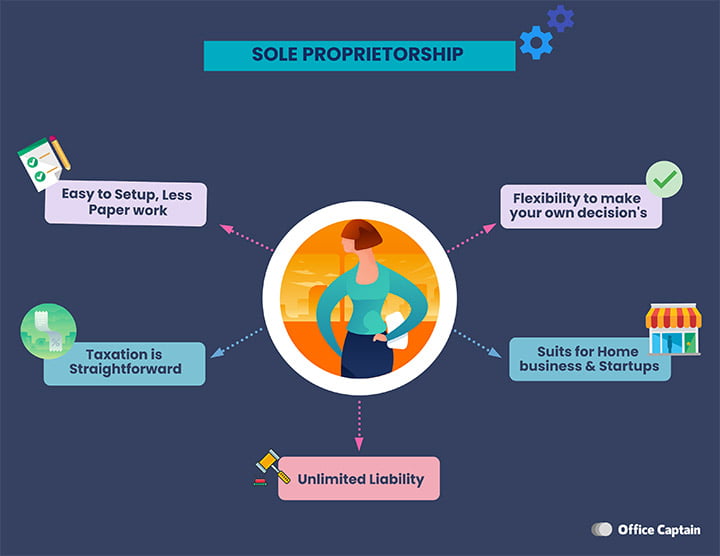Definition of Sole Proprietorship
Sole Proprietorship definition according to Prof Hynes
Sole Proprietorship is that form of business which has a single owner, who has the total responsibility of the business, who runs the business and also bears the risk on the failure of business.

Limitations of Sole Trader-ship (Proprietorship)
The following are the main demerits of this system
-
Limited Capital
The arrangement of capital in a sole trader business has to be done by its owner from his private resources, which could be limited to his friends and relatives. Thus, due to limited capital, the business also becomes limited.
-
Limited Management Skills
The organization and management of a sole trade business are done by its owner, whose mental efficiency and skills are limited up to a certain extent. Hence the development of business also becomes limited up to that extent.
-
Unlimited Liability
A sole proprietor has to bear the loss of his business himself because he is the sole owner of the business. If the losses of business cannot be recovered from the assets of the business then his private property may be utilized to recover the loss.
-
Loss in Absence
The success of a sole proprietorship depends on the supervision of the proprietor. If due to certain reasons, like – ill-health, etc., the proprietor remains absent from the office or goes out of the station, the efficiency of work starts declining, because the whole responsibility of work would be on employees, and they would never work at the same level of efficiency.
-
Limited Credit
The credibility of each person is limited. Since a sole proprietorship business belongs to a single person, thus, his credit also is limited to a certain extent. Thus, he is unable to attain the required amount of loans and other facilities beyond that extent. This restricts the progress of the business.
-
Doubtful Secrecy
For a sole proprietor business, secrecy in business matters becomes a big problem. Due to secrecy, the money lenders who give money to the sole proprietor doubt his financial position of him, and it becomes difficult for him to attain more loans from money lenders.
-
Temporary Existence
The existence of a sole proprietorship firm is not permanent. When the owner of the business dies or becomes incapable of carrying on the business due to certain reasons, and there is no heir or successor to his business, the business automatically comes to an end. It is also not necessary that his heir is able to successfully run the business, as he previously did.
-
Limited Business Area
It is very difficult for a sole proprietor to expand his business after a certain limit. Thus, the business of sole proprietor runs in a limited area.
-
Unsuitable for Big Business
After knowing all the disadvantages it can be said that for big business projects, the sole proprietorship system is unsuitable.
Is Sole Proprietorship the Best
Is the Sole Trade Always Small?
It would not be justified to say sole proprietorship is the best, by analyzing the above merits. After watching all the points it can be said that “Sole proprietorship is the best only up to the point when its size is small because a single person (its owner) cannot control it when its size increases beyond a limit“. Thus, a sole proprietor business is not always small, but it is the best, in a small size.
